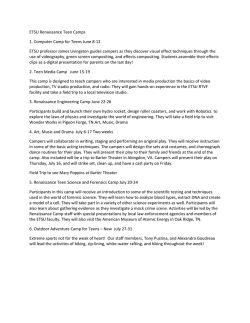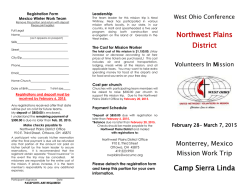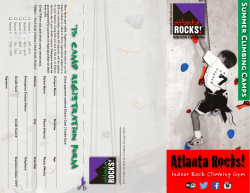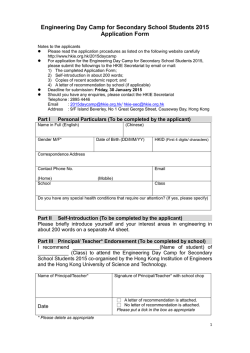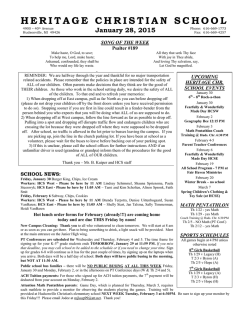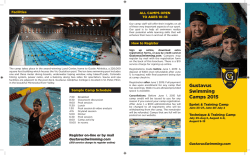
Field Camp Information packet
West Virginia University Geology 404, Geology Field Camp www.geo.wvu.edu/~kammer/geol404.htm Geology of: Black Hills of South Dakota, Powder River Basin, Wyoming, Bighorn Mountains, Wyoming, Yellowstone National Park, Grand Teton National Park, and Southwest Montana May 24 – June 27, 2015 Faculty: Dr. Thomas Kammer Dr. Mitch Blake Jon Knapp, Ph.D. student Dr. Jaime Toro Dr. Joe Donovan Dr. Deng Gao Geology 404: Geology Field Camp, 6 credits www.geo.wvu.edu/~kammer/geol404.htm Format: Five weeks of geologic field work in the Northern Rocky Mountains. Field areas will include the Black Hills, Big Horn Mountains, Yellowstone National Park, Grand Teton National Park, and the Basin and Range of SW Montana. Map areas will include folded and faulted sedimentary rocks, a variety of igneous rocks, and surficial deposits. Prerequisites: GEOL 285, Petrology; GEOL 341, Structural Geology (with lab!), and GEOL 311, Stratigraphy-Sedimentation. Grades: Grades are based on field exercises. The final grade is based on the maps and field notebooks and exercises produced by each student. The faculty reserve the right to deduct up to 10% for poor attitude (attitude points), including discipline problems. Educational Goals: 1. To learn how to describe and log stratigraphic sequences of sedimentary rocks. 2. To learn how to construct geologic maps of areas comprising several square miles. Students use topographic base maps, aerial photos, GPS units, and Silva compasses to map two separate areas encompassing a variety of folded and faulted sedimentary rocks often in association with igneous rocks. 3. To learn how to identify and map surficial deposits. Students will prepare a detailed map of a relatively small area by mapping on aerial photographs and enlarged topographic base maps. 4. To make observations concerning regional geology, including changes in sedimentary facies, structural deformation, tectonics, and geologic history. 5. Ancillary goals include: gaining confidence in making geologic observations and interpretations; broadening of geologic experience beyond the classroom; learning to deal with incomplete or apparently contradictory geologic data; and learning to cooperate and work in the field with fellow geologists. 6. Geology 404 is a capstone experience that requires students to demonstrate mastery of the concepts and skills acquired during their undergraduate years. Important Dates and Deadlines in 2015 Jan. 27 Jan. 30, Friday March 2 April 15 Wednesday April 24, Friday 4:30 pm. 325 Brooks. Second organizational meeting -MANDATORY $400 deposit due Deadline to declare travel plans for securing $300 discount 4:45 pm. 325 Brooks. Final organizational meeting -MANDATORY Final payment due for Field Camp fee – we’ll let each person know the amount owed. 4 ANTICIPATED EXPENSES, 2015 1. Tuition: 6 credits, resident or non-resident rate based on your situation. Be sure to register during spring semester for GEOL 404 in Summer School. Also, pay your tuition by the start of summer school or Admissions and Records will delete you from the course. 2. Scholarships: Approximately $4,000 in merit-based scholarships will be distributed. The largest award is $500; the smallest award is $100. Also, in recent years, several students applied for and received approximately $350 each for Undergraduate Enrichment Grants from the College of Arts and Sciences, but funding is not guaranteed. The faculty will work with students to help them apply for these grants during the spring semester. 3. Field Camp Fee: $1,850 (estimated), includes housing and meals at Black Hills State University (BHSU) and University of Montana-Western (UM-W) for a total of 25 days and nights, plus 9 nights in motels at Yellowstone National Park and on the road out and back. However, students opting to fly to Rapid City, SD, and fly home from Bozeman, MT or Rapid City, will receive a $300 discount on the Field Camp fee. You must purchase your own airline tickets, but you will avoid 5 long days of van travel for the trip out and back. 4. Food when not in dormitory cafeterias: $300-$400, depending on your eating habits. Purchase your food in grocery stores and not in restaurants if you want to save money. 5. Travel will be in University vans while at Field Camp ($150 discount for student drivers). Students may choose to take their own cars to Spearfish, SD, but not to Dillon, MT. Students may want to do some sightseeing both before and after Field Camp, hence they may take their cars to Spearfish, SD, but they may not use their own cars for field work. On the return trip, we will drop off anyone who has left a car in Spearfish. Students who travel independently by private auto will also receive a $300 discount. A $400 deposit (non-refundable) on the Field Camp fee is due Friday, January 30, 2015, payable to the Department of Geology and Geography, WVU; give to Donna Titus in Room 330 Brooks. Personal check is OK; $25 late fee, no exceptions. Your deposit will be accepted when you have filled out and signed the Risk Notice form. You must pay the deposit to be considered for a scholarship. The balance is due Friday, April 24, 2015, paid with either a cashier’s check or money order made out to the Department of Geology and Geography, WVU; there is a $50 late fee, no exceptions. The exact amount of the balance to be paid will be determined before the last organizational meeting on April 14, 2015 after all reservations have been made and expenses calculated. Students on financial aid should consult the Financial Aid Office as soon as possible. All students are required to have Medical/Hospitalization Insurance. You may not attend Field Camp if you do not have this insurance. You should also be aware that West Virginia University does not provide medical insurance for non-employees riding in a University vehicle. 5 Why Should Students "Do Geology" in the Field? Some observations made at the symposium: "Geology Field Camp in the Geology Curriculum", Geological Society of America Annual Meeting. A. By doing geology in the field students learn by personal discovery a great deal of geologic information that they can use to solve geologic problems in the present and in the future. Students learn to integrate their knowledge from a variety of geologic subdisciplines and then develop the skills and confidence to solve complex geologic problems. Students also learn how to collect and analyze field data and in so doing come to understand the limitations of such data. Students learn how to make and record observations in the field, formulate hypotheses, and then test their hypotheses. Finally, students learn how to make interpretations and predictions from data that are necessarily inadequate, incomplete, and imprecise, preparing them for solving problems as professional geologists. B. All geologic studies are ultimately based on geologic maps, field observations, or field sampling. All geologists need basic field skills, including the ability to read and locate on topographic maps and air photos, recognize geologic relationships at the "outcrop level", and collect and record rock descriptions, structural data, and other data systematically. However the mere observation and recording of field data is an insufficient goal. These data must be analyzed, interpreted, and integrated into a geologic map and cross sections and also placed in a regional context. Creation of a geologic map requires that students develop and use a wide variety of field skills. During this process students make selective observations, formulate and test hypotheses, and wrestle with the uncertainties of field data, insufficient exposure, and the interpretive nature of geologic maps. In short, they learn to think like a geologist. Regardless of whether graduates ever engage in field work, they will use geologic maps. Since geologic maps describe and interpret the earth, the method of their creation is of singular importance to geologists. All geologists should experience the process of preparing a geologic map to develop an appreciation for the interpretive nature of geologic maps and the uncertainty inherent in field geology. C. The purpose of field camp is to study rocks in the field and to learn how they have behaved -rocks in pieces larger than hand specimens, which we study in the laboratory, and smaller than mountain ranges, which we study regionally. Students at field camp prepare geologic maps and measure stratigraphic sections because doing so is the only way they can demonstrate that they understand the rocks. Thus what are typically regarded as the products of field camp -- maps-- are really a byproduct. These days most geology majors plan to specialize in hydrogeology or environmental geology. The scale at which students study rocks at field camp is more applicable to environmental problems than to the problems of more traditional branches of geology, such as petroleum exploration or tectonics. 6 Geology 404 Rules General Rules 1. Alcoholic beverages may not be transported or consumed in University vehicles. 2. Alcoholic beverages may not be stored or consumed in the dormitories at Black Hills State University or the University of Montana-Western. The penalty will be the automatic loss of a letter grade in the course, and a possible police citation. 3. When visiting bars, do not drink and drive. Either walk or use the designated driver system. 4. When traveling in vans we will use the buddy system. Make sure you tell a buddy you are leaving the group to find a restroom or food. Do not be left behind! It is a real possibility when 25 people are traveling together. Keep an eye on what is going on. It may not be obvious to the rest of the group if just one or two people are missing. People should particularly help keep track of who is riding with them in their van. 5. Smoking is not permitted in the field because of the serious danger of brush or forest fires. Smoking is also not permitted in the dormitories. 6. Leave all ranch gates the way you found them. Try to avoid damaging fences when crossing. 7. Do not be late. Be aware of required departure times in the morning, end of day, and on extended field trips. Morning departures are precisely at 8:00 a.m. every day unless told otherwise. 8. No fireworks, firearms, or weapons (does not include pocket knives). They will be confiscated and possibly thrown away. 9. Never vandalize by placing graffiti on outcrops. Local people do not appreciate WVU carved into their rocks. Field Rules and Advice 1. Safety in the field. Field hazards include steep terrain, cliffs, loose rock, barbed wire fences, rock chips from hammers (wear safety glasses or at least cheap sunglasses) and a variety of other hazards too numerous to mention. The main thing is to think when you are in the field and to anticipate the consequence of your activities. In some areas we will be miles and hours from help. Rock rolling and other nonsensical behavior are strictly forbidden. If you have agreed to meet someone at a certain time, be there 5 minutes early; work on your map while waiting. When working in rugged country, keep a partner in sight or tell someone where you will be and when you expect to return. If lost, don't panic, trust your map and compass; use them to navigate to a known area. If caught out after dark, do not walk in the dark; sit down, grin and bear it. We will look for you in the morning. 7 2. Animals. We generally are not bothered by animals in the field; so, you should not bother them. You should be aware that South Dakota and Montana are home to bears (rare in the areas we will be in), rattlesnakes, domestic bulls, and ticks, all of which can cause harm to unsuspecting geologists. When climbing or hiking, never put your hands or feet in places where rattlesnakes might be lurking. If given the chance, snakes will scurry away, but when confronted and cornered they may feel compelled to strike. It is also a good idea to check for ticks periodically. If you find a tick on you, use a tick-removing tool to get it out or get someone to help you remove it. You can usually remove a tick by turning it over and pulling it gently so as not to break off its head. 3. Weather. Foul weather can be one of our biggest problems. If we get caught in bad weather, don't whine since we can't change it. Always carry a raincoat and sweater or fleece or light jacket in your backpack. In the event of foul weather on a field day, do not sleep in. The instructors will make a decision after breakfast whether to depart at the normal time or later. Because field time is precious, elimination of even part of a day seriously impacts the schedule and, conceivably, a previously designated office day or off day might become a field day. Thus, if a field day is canceled use the time to work on your maps and reports. 4. Lightning. Stay off high ridges and out of broad open spaces during electrical thunderstorms. Also, stay clear of isolated tall trees. When severe thunderstorms move through the area, be prepared to return to the vans; remain in the van until the storm has passed. If it is not possible to readily return to the van, sit down in a safe area, e.g., in a forest and/or off the ridges. 5. Heat, sunburn, and blisters. On hot days avoid dehydration, drink plenty of water before you leave in the morning, while you are in the field and on returning in the evening. Sunburns can be incapacitating and should be avoided by the use of a good sunscreen. Wear a hat on sunny days. Always carry moleskin or blister pads in your daypack. A first aid kit is kept in each van. 6. Etiquette. We are dependent on using private land for some of our field exercises and are only welcome to do so as long as we are considerate of the land and the landowners. (a) Always ask permission for access to private property. Sometimes a geologist is not sure if he/she is crossing private property; at such times walk slowly and remain conspicuous, (b) leave gates as you find them (c) do not climb fences that could break or become unwired; go through or under the fence, (d) be careful with fire; DO NOT SMOKE IN THE FIELD, (e) dispose of human waste properly. Etiquette also involves safety, promptness, etc. If, by your actions, you inconvenience the group (stay on schedule, be on time), that is a breach of etiquette which may not be appreciated. 7. Recommended treatment for snakebite. No WVU students have been bitten by a venomous snake in faculty memory, but it is possible. The old method of lancing the wound, sucking out the poison and applying a tourniquet is no longer recommended. New research has shown that venom molecules are so large that they travel in the lymph system instead of in the bloodstream. The treatment is to remove any constricting items from the bitten extremity, apply constricting bands about 2 inches above and below the bite (but never across a joint). The constricting bands should be snug to restrict the flow of lymph fluid but not tight enough to cut off venous circulation (monitor pulse at wrist or ankle). If no bands are available, use a bandana, a hankie, or any other piece of cloth that you can wrap around the limb. If an elastic bandage is available, it can be wrapped snugly about a wide area encompassing the wound. Keep 8 the victim calm, conserve body heat, keep the limb immobilized (use a splint) and send for assistance. In general, the best course of action is to get to a hospital emergency room. Dorm Rules 1. Do not pound on rocks in your rooms or on campus. The universities specifically states that when we leave the rooms must be clean and rock-free. 2. Do not mark on or damage walls, floors, furniture or other dormitory property. Any damage to rooms or public areas will be directly billed to the occupant. Cooking is not allowed in the rooms. There is a replacement charge of $100 for lost room keys. 3. Do not take food from the cafeteria other than your bag lunch. 4. Use or possession of illegal drugs (including marijuana) will automatically result in dismissal from the course. In case of dismissal, students will be required to leave field camp and find their own transportation home. 5. Be particularly careful driving around campus and in town. When visiting bars in Spearfish or Dillon, do not drink and drive; choose a designated driver, walk back to campus, or call someone to come get you. Always be courteous and civil to the local people. 6. Be relatively quiet after 8 p.m. Stereos, radios, TVs, and loud noise should be kept down so as not to bother your neighbors, including fellow students working on their maps and notebooks. 7. After 10 p.m. you should be quiet enough for people to sleep. 8. Laundry facilities are available in the dorm buildings. Mail can be picked up at the dorm office each evening. Various campus facilities (library, gym, etc.) might be available, but many have limited summer hours and are often closed in the evening after we come back from the field. The computer situation at each campus changes from year to year. Public computers are generally available only at UM-W. WiFi has been available in the dorms at both universities. 9 WVU GEOLOGY FIELD CAMP INFORMATION General Information Geology Field Camp is a 5-week, 6-credit, course that serves as the capstone experience for geology majors. The Camp will be based approximately two weeks in Spearfish, SD, at Black Hills State University (BHSU) [www.bhsu.edu], and two weeks in Dillon, MT, at University of Montana Western (UM-W) [www.umwestern.edu], with a 4-day trip across Wyoming. Field camp is designed primarily as a structural mapping camp working with Rocky Mountains geology. In addition, students are exposed to a generous dose of stratigraphy, sedimentology, mineralogy, petrology, geomorphology, and paleontology. Students will be riding in University vans, along with everyone’s gear. Space is limited so each student is limited to the following: one large piece of soft luggage, and one day pack holding drafting supplies (in a small “tackle” box) along with field gear and rock hammer, and field boots tied together. With faculty permission, students may take their own vehicle and fellow students to South Dakota. However, we will take only the University vans on the Wyoming and Montana legs of Field Camp, so your gear for that part of Field Camp will be limited to the above requirements. Every student MUST HAVE personal hospitalization insurance in case of an accident. Field geology is a hazardous profession and the potential for injury or illness is real. The kind and amount of coverage should be sufficient to deal with the setting and risk factors of a sustained outdoor activity. Camp Rules Field Camp is not a military-style boot camp, but a certain number of rules are necessary to maintain an orderly environment for effective learning. Make sure you carefully read and understand the set of rules you were given. Work and Recreation You will work hard at Field Camp. Field work, or classroom work, is six days a week. Vans leave for the field at 8:00 a.m. sharp and return at approximately 5:15-5:30 p.m. when staying in the dorms - and later when traveling. The required evening work session begins at 8:00 p.m., SundayFriday, and typically lasts a minimum of two hours. Saturday evenings are for recreation, and the first two and fourth Sundays are off until the evening meeting at 8 p.m. Both campuses where we will be staying have student rec centers with a gym, pool, etc. There are also computer centers where you can check your email. You may want to bring a frisbee to toss after dinner. On your days off you can explore the areas around Spearfish and Dillon. In short, there isn't a lot of free time, but what there is we make good use of! We firmly believe that work must be interspersed with play. In this environment of nearly total immersion in geology you will learn much more about geology than you could ever learn during a similar amount of time on campus. Field camp will turn you from a geology major into a geologist. At the time it may seem like a lot of hard work, but field camp will definitely be the academic highlight of your undergraduate years. 10 Clothing Bring enough clothes for 8 days at a time. You will need casual clothes and field clothes. For the field you will need appropriate outdoor ware. Some people just wear old pants and shirts, others get expensive hi-tech sporting gear. We dress casually when not in the field. The weather will range from absolutely beautiful to unbelievably bad. South Dakota weather in late May-early June is typically mild, with high temperatures in the 60’s to 80’s, but it can be rainy and cold and in the low 40’s. Record lows and highs for the Black Hills in late May range from the 30’s to the 90’s. For Montana the weather will be similar, even though we will be there later in June, because Dillon is at a higher elevation (5,000 ft.) than Spearfish (4,000 ft.). So, the rule is, prepare for everything. Bring warm clothes – layers such as polar fleece, wind breaker, knit hat, lightweight water-resistant gloves that allow dexterity, etc. Cotton jeans and sweatshirts may suffice on dry days, but they lose a lot of heat when wet. Wet cotton clothes in the 40’s can lead to hypothermia. Wool and hi-tech fabrics retain much more heat. Polypropylene underwear and socks are expensive and optional. Even on warm days, early morning temperatures may be cold. Don't underestimate how cold it can get at a "summer" camp. We will probably see snow at higher elevations. Certainly it will rain, and we will have to work regardless. So rain gear, both a jacket and pants, is absolutely required. Plastic-coated rain suits work very well in cool temps, but can be hot and sweaty in warm temps. Cold rain has been a problem in the Black Hills, and those without rain pants have suffered the effects of hypothermia. GORE-TEX raincoats are breathable and work better in warm weather, but will leak around the shoulders from the pressure of a backpack. The most important item of all is a comfortable pair of field boots. You've got to take care of your feet. Your boots must be broken in before camp to avoid getting blisters. You'll be hiking several miles a day over rough terrain, and if you don't take care of your feet you'll be in bad shape. You might want to consider wearing double socks and bringing moleskin for blisters. Certainly bring lots of socks, enough for at least 8 days at a time. Don't buy engineer's boots (pull-on, no laces), rubberized boots, or super heavy-duty backpacking boots. Have your boots waterproofed if they are leather. You may want to consider "GORE-TEX" boots or other lightweight boots with fabric panels. You'll also want to have a pair of sneakers to walk around town in, plus you can wear them on easy field days. Wearing sandals in the field is not a good idea, even if the weather is hot, because there is lots of poison ivy, not to mention cactus and other prickly vegetation. Flip-flops in the field, even for roadside geology, are a bad idea. However, you should bring flip-flops for the shower. The rest, as far as clothes are concerned, is up to you. If you are prone to getting poison ivy you should bring long pants and shirts with long sleeves for field work in the Black Hills. Even if you don't get poison ivy, there is lot's of cactus and yucca to scratch your legs in Montana. You can do your laundry in the dorms. When you know you’ve been in poison ivy it’s a good idea to throw those field pants in the wash, otherwise the toxic oils will build up in your clothes and give you a bad reaction. The dormitories will provide sheets, pillows, and blankets. You may want to bring warm sleepware if the weather turns cold because the heat will be off in the dorms. The blankets at BHSU are very thin, so you might want to bring your own blanket or thin sleeping bag, but you can purchase these items at the local WalMart. You will need to bring a towel for UM-W. Everyone must have a functioning alarm clock (or watch or cell phone) that will get them up in the morning. You may pick your roommates (same sex) ahead of time. 11 Gear As for work items, we will supply measuring tapes, GPS units, maps, and aerial photos. You will need to provide the following items for drafting and field work (shop around for good prices; check out Office Depot): Office materials: 1. Micro-tipped, felt-tipped black pens for drafting maps and cross sections. At least some should be waterproof. 2. Colored pencils - a variety pack. Buy good quality pencils such as Eagle or Berol, not waxy kid’s pencils. 3. Mechanical pencils with 0.5mm lead, or good quality wood pencils; at least two (more if you lose pencils), one with HB the other with 2H lead. Pentel is a good brand. Most come with HB lead, which is OK for regular paper but too soft for Rite-In-The-Rain paper: 2H, 2.5H, or 3H are good leads for field maps and notebooks. The lead scale is: soft-2B, B; medium-HB, F, H; hard-2H, 3H, 4H, 5H, etc.. 4. 12" engineers rule 5. Straight edge 6. Good quality soft erasers, rubber rhomb and/or eraser stick. 7. Drafting tape and scotch tape (Buy and share with friends). 8. Liquid "white out". 9. Plain white paper, 8 1/2 x 11; approx. 50 sheets 10. Tracing paper, 8 1/2 x 11, for maps and cross-sections (optional: buy a tablet and share with friends). 11. Protractor. 12. A few large paper clips or size 2 small binder clips for turning in all the papers for each project. 13. An artist's "tackle box" to hold all your drafting materials. 14. USB memory stick to save your work on computers at UM-W. 12 Items you will need for field work: 1. You need to supply your own Silva Ranger compass (or similar); we can loan a compass to anyone who loses or breaks theirs. FYI: In 2015, declination for the Whitewood Peak mapping area was 8 degrees east. Declination for the Dillon area was 13 degrees east. 2. Rock hammer and belt holster. You should always wear eye protection when using a rock hammer. If you don’t normally wear glasses get some shatter-proof sunglasses you can put on when using your rock hammer. 3. Hand lens, 10X, the wider the field the better. 4. Clipboard with a cover to keep your maps and aerial photos clean and dry. We have loaners. 5. Acid bottle, a small squeeze bottle with a screw-on lid. We’ll supply acid re-fills. 6. Grain-size comparison chart from GEOL 311, Sed-Strat class. 7. Scientific calculator with trig functions – you may have an app for this on your cell phone. 8. Two hard cover engineer's field books, with water resistant paper. If you write exceptionally large, you may need a third field book. Pay attention to how the paper is lined and avoid books with lots of little rectangles on the pages. Buy the book early and try out the different pencil leads before purchasing pencils. We will do a group order for field books from Forestry Suppliers, but will plan this well in advance of Camp. 9. 6" ruler divided into tenths for inches, and mm for cm. 10. Small Protractor, although a Silva compass can also be used as a protractor. 11. Water bottles: one that you wear on your belt or put in your backpack. On hot days you will need at least two liters/quarts of water. You may want to consider a “camelback” water system. 12. Two-gallon "zip lock" plastic bags that will fit over your clipboard to keep your maps and notebook dry. The bigger, the better. (Buy a package and share with friends). 13. Pocket knife, but not as a carry-on if flying to or from camp – the TSA will confiscate it. 14. Sunscreen. 15. Any personal medicines you may need in emergency (Insulin, Antihistamines, etc.) first aid supplies such as band-aids and antibiotic ointment. 16. Dependable watch (most digital watches can double as an alarm clock). Plan to carry your field gear in a small backpack that is large enough to carry your lunch, rain gear, a jacket, extra socks, etc. Optional Equipment 1. 2. 3. 4. 5. 6. 7. First aid supplies, small personal kit; moleskin. For larger injuries, there are first-aid kits in the vans. Camera and spare batteries, or your cell phone with a camera. Structural geology textbook. Field guide to rocks and minerals. Personal music device/iPod/cell phone for use in the evening or in the van while traveling. Laundry bag (a large clean garbage bag works as well). Sunglasses – also good for eye protection when using a rock hammer. 13 Risk Notice for Geology 404 Students (Must be completed and turned in with $400 Camp Fee Deposit on 30 January, 2015) The purpose of this notice is to document that you are aware of the potential risks associated with Field Camp. I, (print name) ____________________________________, am a student planning to register in West Virginia University’s Geology Field Camp, Geology 404. Insurance Issues: I certify that I have comprehensive medical/hospitalization insurance. I also carry information on my person regarding any pre-existing medical conditions should I need it when seeking emergency treatment. I realize that I am responsible for all medical costs I may incur while at Field Camp. I understand that West Virginia University’s vehicle insurance policy only covers WVU employees in the conduct of their job performance. I must have my own health insurance coverage in case of an accident. Safety Issues: I understand that potential risks exist in my participating in Geology 404. These risks might include, but not be limited to, those typically associated with outdoor activities such as: A) falling or sliding down a steep slope or cliff; B) tripping and falling over rough terrain, rocks or vegetation; C) being struck by falling rocks or tree limbs, including those knocked loose by myself or other students; D) hypothermia and exposure to the elements; E) crossing a stream or creek at high water; F) encounters with aggressive livestock or pets; G) wildlife, including stinging or biting insects, spiders, and poisonous snakes; H) accidents involving barbed wire fencing; I) electrocution by lightning or touching any exposed wires; J) being struck by a motor vehicle while crossing, standing, or walking along a public or private roadway . I understand that I am primarily responsible for my own safety, therefore I will endeavor to practice safe behavior at all times, including staying with my partner(s) while in the field. The course instructors will endeavor not to place students in unsafe situations. However, I understand that I am free to abstain from any activity I judge unsafe, although I also understand that such abstention might compromise my ability to collect needed data for course assignments and projects. In such cases I will attempt to work with the course instructors to reach a satisfactory arrangement. _____________________________________ Signature and Printed Name _______________ Date 14 Some Important Numbers and Dates Costs: WVU Tuition + Fees (reduced) + ~$1850 Field Camp Fee + Equipment & Supplies + ~ 30 Meals on the road. NOW: Consider how you are going to pay for field camp. Soon – Begin the process of Applying for Financial Aid if needed. 30 January 2015: Initial Deposit of $400 Due, along with Signed Risk Notice. Personal check OK, no cash. Late Penalty: $25. Give to Donna Titus, 330 Brooks. You must turn in a deposit to be eligible for Wilcox or Clarkson Merit Based Scholarships awarded in February! 15 April 2015 – Last Field Camp Meeting, stay tuned for date and time. 24 April 2015: Last Payment of ~$1450 Due. Late Penalty $50. Use cashier’s check or money order payable to: Dept. of Geology and Geography, WVU Well Before Field Camp Starts: Register, Pay Tuition AND Fees. 24 May 2015: Be in Lot 7 across from Brooks Hall at 7:30 for 8:00 a.m. departure if you are riding out in WVU vans. 27 June 2015: Return to Lot 7 around 6:00 p.m.
© Copyright 2026

